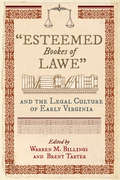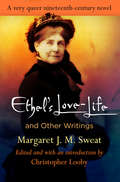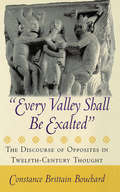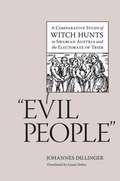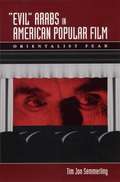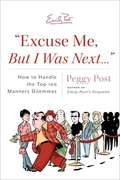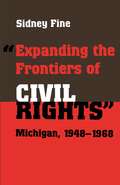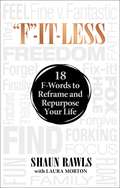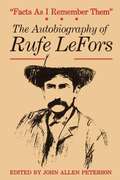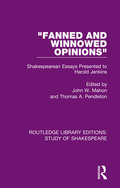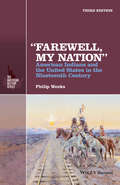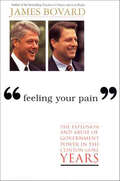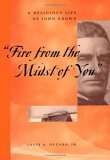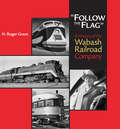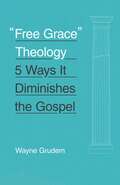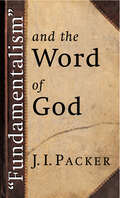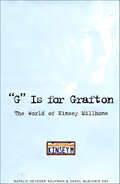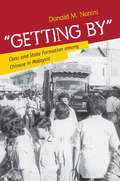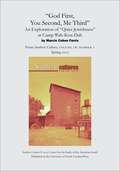- Table View
- List View
"Esteemed Bookes of Lawe" and the Legal Culture of Early Virginia (Early American Histories)
by Brent Tarter Warren M. BillingsVirginia men of law constituted one of the first learned professions in colonial America, and Virginia legal culture had an important and lasting impact on American political institutions and jurisprudence. Exploring the book collections of these Virginians therefore offers insight into the history of the book and the intellectual history of early America. It also addresses essential questions of how English culture migrated to the American colonies and was transformed into a distinctive American culture. Focusing on the law books that colonial Virginians acquired, how they used them, and how they eventually produced a native-grown legal literature, this collection explores the law and intellectual culture of the Commonwealth and reveals the origins of a distinctively Virginian legal literature. The contributors argue that understanding the development of early Virginia legal history—as shown through these book collections—not only illuminates important aspects of Virginia’s history and culture; it also underlies a thorough understanding of colonial and revolutionary American history and culture.
"Ethel's Love-Life" and Other Writings (Q19: The Queer American Nineteenth Century)
by Margaret J. SweatIn a series of lengthy letters, the unsettled and unruly Ethel Sutherland writes to an initially unnamed and ungendered correspondent, and patiently discloses the troubled history of her past romantic attachments to both men and women. Not until the third letter does she reveal that her correspondent is Ernest, the man to whom she is engaged to be married. Wanting to make him understand how all of her past loves are included and sublimated in her love for him, she especially wants to explain how "women often love each other with as much fervor and excitement as they do men"; and although this love is curiously "freed from all the grosser elements of passion, as it exists between sexes," nevertheless it "retains its energy, its abandonment, its flush, its eagerness, its palpitation, and its rapture."Margaret Jane Mussey Sweat (1823-1908), a native of Portland, Maine, and wife of a United States congressman, published Ethel's Love-Life in 1859. The book is sometimes credited as an early—even the first—"lesbian" American novel, but such a label, Christopher Looby observes in his Introduction, somewhat misrepresents what is distinctive and surprising about the book. Ethel's Love-Life confounds our received binary distinctions between the spiritual and the carnal and, indeed, between the sexual and the nonsexual—the boundaries between such categories being not nearly as well-policed at the time as they later became. It is here reprinted, along with Sweat's Verses (1890) and five of her published essays, on Charlotte Brontë, George Sand, the contemporary novel, and the friendships of women.
"Every Valley Shall Be Exalted": The Discourse of Opposites in Twelfth-Century Thought
by Constance Brittain BouchardIn high medieval France, men and women saw the world around them as the product of tensions between opposites. Imbued with a Christian culture in which a penniless preacher was also the King of Kings and the last were expected to be first, twelfth-century thinkers brought order to their lives through the creation of opposing categories. In a highly original work, Constance Brittain Bouchard examines this poorly understood component of twelfth-century thought, one responsible, in her view, for the fundamental strangeness of that culture to modern thinking.Scholars have long recognized that dialectical reasoning was the basic approach to philosophical, legal, and theological matters in the high Middle Ages. Bouchard argues that this way of thinking and categorizing—which she terms a "discourse of opposites"—permeated all aspects of medieval thought. She rejects suggestions that it was the result of imprecision, and provides evidence that people of that era sought not to reconcile opposing categories but rather to maintain them.Bouchard scrutinizes the medieval use of opposites in five broad areas: scholasticism, romance, legal disputes, conversion, and the construction of gender. Drawing on research in a series of previously unedited charters and the earliest glossa manuscripts, she demonstrates that this method of constructing reality was a constitutive element of the thought of the period.
"Evil People"
by Johannes Dillinger Laura StokesInspired by recent efforts to understand the dynamics of the early modern witch hunt, Johannes Dillinger has produced a powerful synthesis based on careful comparisons. Narrowing his focus to two specific regions--Swabian Austria and the Electorate of Trier--he provides a nuanced explanation of how the tensions between state power and communalism determined the course of witch hunts that claimed over 1,300 lives in sixteenth- and seventeenth-century Germany. Dillinger finds that, far from representing the centralizing aggression of emerging early states against local cultures, witch hunts were almost always driven by members of the middling and lower classes in cities and villages, and they were stopped only when early modern states acquired the power to control their localities.Situating his study in the context of a pervasive magical worldview that embraced both orthodox Christianity and folk belief, Dillinger shows that, in some cases, witch trials themselves were used as magical instruments, designed to avert threats of impending divine wrath. "Evil People" describes a two-century evolution in which witch hunters who liberally bestowed the label "evil people" on others turned into modern images of evil themselves.In the original German, "Evil People" won the Friedrich Spee Award as an outstanding contribution to the history of witchcraft.
"Evil" Arabs in American Popular Film: Orientalist Fear
by Tim Jon SemmerlingLooking at their narrative structures and visual tropes, he analyzes how the films portray Arabs as threatening to subvert American "truths" and mythic tales—and how the insecurity this engenders causes Americans to project evil character and intentions on Arab peoples, landscapes, and cultures. Semmerling also demonstrates how the "evil" Arab narrative has even crept into the documentary coverage of 9/11. Overall, Semmerling's probing analysis of America's Orientalist fears exposes how the "evil" Arab of American popular film is actually an illusion that reveals more about Americans than Arabs.
"Excuse Me, But I Was Next..."
by Peggy PostHave you ever been annoyed by cell phone yakkers, line cutters, or movie chatterers? Been confused about who pays at a restaurant? Received a gift you hated? Fumed over how to respond to a nosy question? America's etiquette expert Peggy Post comes to the rescue in this concise, readable handbook devoted to the top 100 etiquette issues everyone wonders about. You'll learn how to politely say "no" to difficult requests, how to introduce someone if you've forgotten his or her name, how to perform damage control for e-mail bloopers, and countless other strategies for handling life's awkward moments. Additional highlights include: Ten Conversational Blunders . . . Five Introduction Goofs . . . Top Dinner-Table Manners Goofs . . . Tipping Guidelines . . . A Family Gathering Survival Guide . . . How to Spot a Dud on the First Date . . . Playdate Etiquette . . . How to Be a Welcome Houseguest . . . How to Simplify Gift Giving . . . Dispelling Wedding Myths . . . and much more. In "Excuse Me, But I Was Next . . . ," Peggy Post distills the essence of etiquette for today's world into the perfect portable book.
"Expanding the Frontiers of Civil Rights": Michigan, 1948-1968 (Great Lakes Books Series)
by Sidney FineAlthough historians have devoted a great deal of attention to the development of federal government policy regarding civil rights in the quarter century following World War II, little attention has been paid to the equally important developments at the state level. Few states underwent a more dramatic transformation with regard to civil rights than Michigan did. In 1948, the Michigan Committee on Civil Rights characterized the state of civil rights in Michigan as presenting "an ugly picture." Twenty years later, Michigan was a leader among the states in civil rights legislation. "Expanding the Frontiers of Civil Rights" documents this important shift in state level policy and makes clear that civil rights in Michigan embraced not only blacks but women, the elderly, native Americans, migrant workers, and the physically handicapped.
"F"-It-Less: 18 F-Words to Reframe and Repurpose Your Life
by Shaun RawlsWhat does it take to say &“F-it!&” and really mean it? To walk away from the circumstances that have you stuck in neutral, or worse, headed in the wrong direction? To reroute your life along a smoother path toward success? To live an &“F&”-It-Less life?Shaun Rawls, popular motivational speaker and founder of Atlanta&’s #1 real estate firm, discovered the answers to those questions and more during one of the most trying, yet triumphant periods of his life. After unexpectedly finding love and consequentially navigating a divorce, the life he knew changed. Even when you are the one to implement such change, it can feel like a punch in the gut, especially when those you care about and with whom you share history are affected. In his attempt to minimize disruption to the company and his wife&’s livelihood, Rawls&’ divorce included handing over to her the operational responsibilities of the successful business they had built together. During this transition, he discovered a whole new lexicon of &“F&” words more powerful than the one we all know. Employing each thoughtfully and practically in his life, he began to craft the existence he had always dreamed of. Words such as &“fragmented,&” &“frustrated,&” &“fractured,&” and &“failed&” helped him identify where he was in the moment and to earnestly assess where he&’d gone wrong in the past. In time he enjoyed days that were &“fine&” or even &“fantastic.&” Prioritizing words such as &“float,&” &“family,&” &“faith,&” &“fun,&” and &“freedom&” reminded him of his destination, while words such as &“find,&” &“forgive,&” &“forget,&” &“fix,&” and &“foxhole&” helped him to get there faster. What he now knows is that these F-words can align us with our purpose and goals, enabling us to live a more intentional and rewarding life. In this infinitely empowering book, Rawls encourages you to use these words to examine your own life—to see if it is one you&’ve consciously crafted or one you simply allowed to unfold. To decide whether you&’re living how you really want to or if there is still much roadwork to be done. To truly listen to your heart and gut, and to honestly acknowledge the areas of your life where you&’ve compromised love and happiness for money, safety, security, or—worse—fear. He coaxes you not to let your best life pass you by, but rather to proactively attain the life you really want. By sharing some of his greatest lessons, Rawls, who is happily remarried and enjoying his expanded family and career, aims to help you avoid some of the same landmines he encountered and to live what he refers to as an &“F-it-less&” life—the life we&’re all entitled to discover, explore, and fulfill for ourselves. Saying &“F-it!&” doesn&’t always mean you are giving in or giving up. With the right tools, it can actually mean you are ready to pursue a better life—one of greater ease, meaning, and purpose—a truly &“F&”-It-Less life.
"Facts As I Remember Them": An Autobiography of Rufe LeFors
by Rufe Lefores John Allen PetersonLeFors wanted to get the facts—as he remembered them—straight. With his sharp eye for texture and detail and keen ear for language and timing, he created a narrative that wonderfully captures the flavor of his life and exciting times.
"Fanned and Winnowed Opinions": Shakespearean Essays Presented to Harold Jenkins (Routledge Library Editions: Study of Shakespeare)
by John W. Mahon and Thomas A. PendletonOriginally published in 1987, "Fanned and Winnowed Opinions" celebrates the scholarship of Professor Harold Jenkins, one of this century’s foremost editors and critics of Shakespeare. All of the essays address Shakespearean topics, and many of the sixteen focus on the years between 1595 and 1605, the period on which much of Professor Jenkin’s work centers: there are, appropriately, three essays on Hamlet. A variety of critical approaches is represented, including the Freudian and the feminist; some essays focus on one play, while others take a thematic approach. Comedies, histories, and tragedies all come under consideration. The contributors include many distinguished scholars, some of whom studied under Professor Jenkins or edited volumes of the Arden Shakespeare under his direction. All of the contributions were specifically written for the Festschrift and had not appeared in print before. In addition to the scholarly essays, the volume features an introduction with an appreciative review of Harold Jenkins’ career and a complete bibliography of his works.
"Farewell, My Nation": American Indians and the United States in the Nineteenth Century (The American History Series)
by Philip WeeksThe fully updated third edition of “Farewell, My Nation” considers the complex and often tragic relationships between American Indians, white Americans, and the U.S. government during the nineteenth century, as the government tried to find ways to deal with social and political questions about how to treat America’s indigenous population. Updated to include new scholarship that has appeared since the publication of the second edition as well as additional primary source material Examines the cultural and material impact of Western expansion on the indigenous peoples of the United States, guiding the reader through the significant changes in Indian-U.S. policy over the course of the nineteenth century Outlines the efficacy and outcomes of the three principal policies toward American Indians undertaken in varying degrees by the U.S. government – Separation, Concentration, and Americanization – and interrogates their repercussions Provides detailed descriptions, chronology and analysis of the Plains Wars supported by supplementary maps and illustrations
"Feeling Your Pain": The Explosion and Abuse of Government Power in the Clinton-Gore Years
by James BovardJames Bovard is no fan of Big Government in the US and under the Clinton-Gore administration. In his new book, Bovard looks at Clinton and Gore's record on such abuses and absurdities as taxes, gun control, the Waco fiasco, AmeriCorps, and federal funding of every program from those dealing with disaster relief to those that put on puppet shows in Northern California. He looks at Hillary Clinton's informal role in the government, as well as Newt Gingrich's poor stewardship of the Republican party in its quest for a leaner federal government. In the style that made Lost Rights a classic, Bovard takes us on a sentimental journey through the last eight years. It's a trip no one will want to miss.
"Fire From the Midst of You": A Religious Life of John Brown
by Louis A. Decaro Jr.Reveals a complex new portrait of John Brown, radical abolitionist and leader of the 1859 raid on Harper's FerryJohn Brown is usually remembered as a terrorist whose unbridled hatred of slavery drove him to the ill-fated raid on Harper's Ferry, Virginia, in 1859. Tried and executed for seizing the arsenal and attempting to spur a liberation movement among the slaves, Brown was the ultimate cause celebre for a country on the brink of civil war.“Fire from the Midst of You” situates Brown within the religious and social context of a nation steeped in racism, showing his roots in Puritan abolitionism. DeCaro explores Brown's unusual family heritage as well as his business and personal losses, retracing his path to the Southern gallows. In contrast to the popular image of Brown as a violent fanatic, DeCaro contextualizes Brown's actions, emphasizing the intensely religious nature of the antebellum US in which he lived. He articulates the nature of Brown's radical faith and shows that, when viewed in the context of his times, he was not the religious fanatic that many have understood him to be. DeCaro calls Brown a “Protestant saint”—an imperfect believer seeking to realize his own perceived calling in divine providence.In line with the post-millennial theology of his day, Brown understood God as working through mankind and the church to renew and revive sinful humanity. He read the Bible not only as God's word, but as God's word to John Brown. DeCaro traces Brown's life and development to show how by forging faith as a radical weapon, Brown forced the entire nation to a point of crisis. “Fire from the Midst of You” defies the standard narrative with a new reading of John Brown. Here is the man that the preeminent Black scholar W.E.B. Du Bois called a "mighty warning" and the one Malcolm X called “a real white liberal.”
"Follow the Flag": A History of the Wabash Railroad Company
by H. Roger Grant"Follow the Flag" offers the first authoritative history of the Wabash Railroad Company, a once vital interregional carrier. The corporate saga of the Wabash involved the efforts of strong-willed and creative leaders, but this book provides more than traditional business history. Noted transportation historian H. Roger Grant captures the human side of the Wabash, ranging from the medical doctors who created an effective hospital department to the worker-sponsored social events. And Grant has not ignored the impact the Wabash had on businesses and communities in the "Heart of America."Like most major American carriers, the Wabash grew out of an assortment of small firms, including the first railroad to operate in Illinois, the Northern Cross. Thanks in part to the genius of financier Jay Gould, by the early 1880s what was then known as the Wabash, St. Louis & Pacific Railway reached the principal gateways of Chicago, Des Moines, Detroit, Kansas City, and St. Louis. In the 1890s, the Wabash gained access to Buffalo and direct connections to Boston and New York City.One extension, spearheaded by Gould's eldest son, George, fizzled. In 1904 entry into Pittsburgh caused financial turmoil, ultimately throwing the Wabash into receivership. A subsequent reorganization allowed the Wabash to become an important carrier during the go-go years of the 1920s and permitted the company to take control of a strategic "bridge" property, the Ann Arbor Railroad.The Great Depression forced the company into another receivership, but an effective reorganization during the early days of World War II gave rise to a generally robust road. Its famed Blue Bird streamliner, introduced in 1950 between Chicago and St. Louis, became a widely recognized symbol of the "New Wabash." When "merger madness" swept the railroad industry in the 1960s, the Wabash, along with the Nickel Plate Road, joined the prosperous Norfolk & Western Railway, a merger that worked well for all three carriers.Immortalized in the popular folk song "Wabash Cannonball," the midwestern railroad has left important legacies. Today, forty years after becoming a "fallen flag" carrier, key components of the former Wabash remain busy rail arteries and terminals, attesting to its historic value to American transportation.
"Free Grace" Theology: 5 Ways It Diminishes The Gospel
by Wayne GrudemMust the gospel message include a call for people to repent of their sins? “No,” say Free Grace advocates. Is evidence of a changed life an important indication of whether a person is truly born again? “No, again,” these advocates say. But in this book, Wayne Grudem shows how the Bible answers “Yes” to both of these questions, arguing that the Free Grace movement contradicts both historic Protestant teaching and the New Testament itself. This important book explains the true nature of the Christian gospel and answers the question asked by so many people: “How can I know that I’m saved?”
"Fundamentalism" and the Word of God
by J. I. PackerThis modern classic by the author of Knowing God provides a comprehensive statement of the doctrine of Scripture from an evangelical perspective. J. I. Packer explores the meaning of the word "fundamentalism" and offers a clear and well-reasoned argument for the authority of the Bible and its proper role in the Christian life.
"G" Is for Grafton: The World of Kinsey Millhone
by Natalie Hevener Kaufman Carol Mcginnis KayIn this well cited and extraordinarily researched revised edition, the authors have collected every fact about America's favorite female sleuth, Kinsey Millhone. Collaborating and consulting with Sue Grafton, the author of the Kinsey Millhone alphabet mysteries and the creator of Kinsey, the authors give Kinsey fans a notable reference for that once mentioned fact they're just dying to know. In which book was a hit man after Kinsey? What does Kinsey think of killing? Who are Kinsey's friends? What does Kinsey laugh at? Where did Kinsey receive her P.I. training? The answers to these questions and hundreds more await readers of "G" Is for Grafton. The book also includes a chapter on Grafton's writing style and Grafton's thoughts on Kinsey. Updated through "O" Is for Outlaw.
"G" is for Grafton: The World of Kinsey Millhone
by Natalie Hevener Kaufman Carol McGinnis KayRevised and updated through "O" Is for Outlaw, the Edgar Award Winner for Best Biographical Work is the essential reader's companion to the world of Sue Grafton's Kinsey MillhoneWith the cooperation of Sue Grafton, who provided unprecedented access to her working journals, authors Natalie Hevener Kaufman and Carol McGinnis Kay have created a fully dimensional biography of Kinsey Millhone that will answer every question readers have ever had. Here is a feast for Kinsey's fans, including such features as time lines, maps, floor plans, case logs, and photographs.But this book is also a revealing journey into the mind and work habits of Kinsey's creator. You'll learn why Grafton chose to write detective fiction and how she responds to runaway plot lines and unruly characters. You will find out what titles she has discarded in the series, what she plans for Kinsey's future, and how she sees their evolving relationship. Ultimately, you'll understand why Grafton is so esteemed in the field of detective fiction and, from an analysis of her craft, why she has earned so prominent a place in American letters.
"GEnron"? Markopolos versus General Electric (B)
by David Lane Jonas HeeseSupplement to the (A) case that offers an assessment of the August 2019 Markopolos report on General Electric.
"GEnron?" Markopolos versus General Electric (A)
by David Lane Jonas HeeseIn August 2019, Harry Markopolos-the forensic accountant known for uncovering Bernie Madoff's Ponzi scheme-alleged that General Electric had committed accounting fraud totaling $38 billion, coining the term "GEnron" for perceived similarities with the 2001 accounting fraud at Enron that brought down that company and its auditor. Specifically, Markopolos claimed, GE would need to generate $29 billion in reserves against its insurance obligations, and restate its financials to recognize $9 billion in unreported losses on an oil subsidiary. Though GE management rejected these assertions, repeated writedowns and restatements of GE's performance since 2017 had made investors wary. They now scrambled to assess the merits of Markopolos's claims.
"Getting By": A Historical Ethnography of Class and State Formation in Malaysia
by Donald M. NoniniHow do class, ethnicity, gender, and politics interact? In what ways do they constitute everyday life among ethnic minorities? In "Getting By," Donald M. Nonini draws on three decades of research in the region of Penang state in northern West Malaysia, mainly in the city of Bukit Mertajam, to provide an ethnographic and historical account of the cultural politics of class conflict and state formation among Malaysians of Chinese descent. Countering triumphalist accounts of the capitalist Chinese diaspora in Southeast Asia, Nonini shows that the Chinese of Penang (as elsewhere) are riven by deep class divisions and that class issues and identities are omnipresent in everyday life. Nor are the common features of "Chinese culture" in Malaysia manifestations of some unchanging cultural essence. Rather, his long immersion in the city shows, they are the results of an interaction between Chinese-Malaysian practices in daily life and the processes of state formation--in particular, the ways in which Kuala Lumpur has defined different categories of citizens. Nonini's ethnography is based on semistructured interviews; participant observation of events, informal gatherings, and meetings; a commercial census; intensive reading of Chinese-language and English-language newspapers; the study of local Chinese-language sources; contemporary government archives; and numerous exchanges with residents.
"Globalization" and Relocation in a Vertically Differentiated Industry
by Tito Cordella Isabel GriloA report from the International Monetary Fund.
"God First, You Second, Me Third": An Exploration of 'Quiet Jewishness' at Camp Wah-Kon-Dah
by Marcie Cohen FerrisThis was an anxious time for American Jews, stung by the anti-Semitic quotas and discrimination of the interwar years and the growing horror regarding the fate of European Jewry as the Holocaust came to light in the 1940s."This article appears in the Spring 2012 issue of Southern Cultures. The full issue is also available as an ebook.Southern Cultures is published quarterly (spring, summer, fall, winter) by the University of North Carolina Press. The journal is sponsored by the University of North Carolina at Chapel Hill's Center for the Study of the American South.
"Golden Leash" Pay for Directors at The Dow Chemical Company
by Suraj Srinivasan Ian D Gow Neeraj GoyalIn November 2014, The Dow Chemical Company was faced with the prospect of a proxy battle with prominent hedge fund and activist investor Third Point Management. The activist had criticized Dow's recent performance and advocated that the company split itself to maximize its potential. The activist also proposed two director candidates to join Dow's board. Third Point offered its director nominees what had come to be known as a "golden leash" incentive structure - a significant amount of incentive payment from the investor if the company performed well. Supporters and critics had weighed in on the pros and cons of such incentive schemes for corporate independent directors. Faced with the prospect of a proxy fight, Dow's board had to decide whether to invite the two directors on to the company's board knowing they came with the special payment scheme from the hedge fund.
